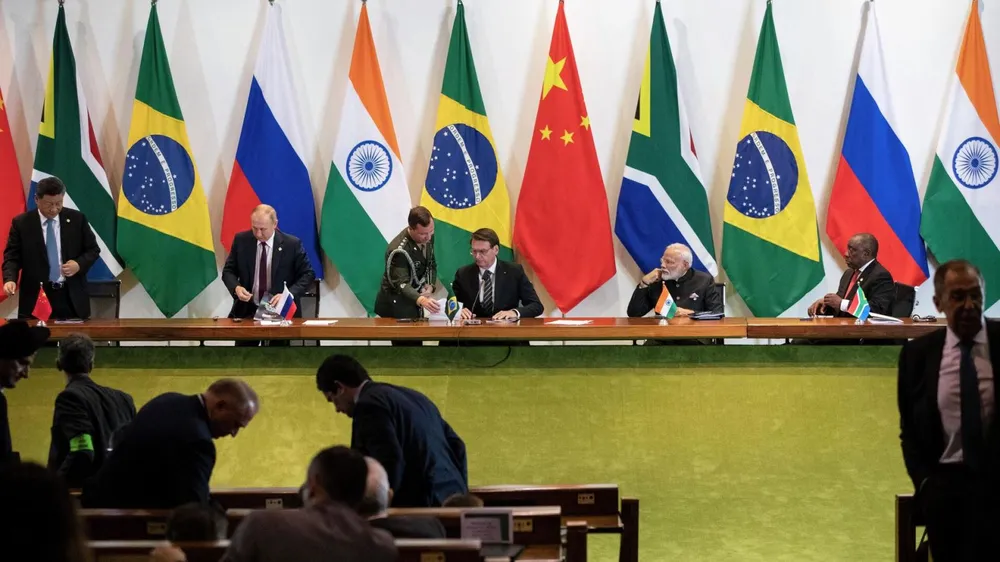
Additionally, they explored the feasibility of broadening the membership of the prominent group of emerging global economies known as BRICS.
JOURNALIST: - Sir, what factors contribute to the resilience of the Russian economy amidst the ongoing 'sanctions storm,' even after enduring unprecedented sanctions from the US and Western nations, particularly in relation to the Russia-Ukraine conflict?
Associate Professor Dr. YKOVLEV ARTEM ALEXANDROVICH: - First and foremost, the Russian economy operates as a genuine market economy. The sanctions have highlighted its ability to swiftly adapt to changing circumstances and endure challenges. Additionally, prudent decisions by the leadership and effective measures implemented by the government's economic and financial sectors have bolstered Russia's resilience against sanctions.
Secondly, Russia maintains significant influence globally, particularly in energy exports. The imposition of sanctions has led to an increase in energy prices, further supporting the Russian economy.
Thirdly, the sanctions have spurred Russia's pursuit of import substitution policies, prompting rapid development across various sectors, including manufacturing and processing industries, thereby stimulating economic growth.
- In your perspective, what role do China and other Southern Hemisphere countries play in the current Russian economy?
- Undoubtedly, China and Asian nations hold immense significance for Russia, serving as its primary strategic partners. The shift towards the East by Russia commenced prior to the imposition of sanctions in 2014, with substantial sanctions following in 2022. Consequently, China assumed the position of Russia's top trading partner since 2014. Moreover, a comprehensive strategic partnership agreement was inked between Russia and Vietnam in 2012, further solidifying economic ties between Russia and Asian nations. Going forward, economic relations between Russia and Asian countries are poised to accelerate even more. Notable partners for Russia include China, India, Vietnam, as well as other East and Southeast Asian nations."
- Sir, it's notable that the sanctions imposed by the US and EU on Russian exports exclude vital products from the Russian energy sector, such as liquefied natural gas (LNG), uranium fuel for nuclear plants, and pipeline gas. What is the rationale behind this decision?
- As previously mentioned, Russia holds a significant position in the global energy market. Imposing sanctions on these commodities would inevitably lead to price hikes and exert a substantial adverse impact on the economies of the sanctioning nations. For instance, Russia commands 40% of the world's enriched uranium market, and any discussion of imposing sanctions triggers price increases, thereby posing challenges for Western economies. Therefore, I believe there's unlikely to be an expansion of sanctions targeting these sectors in the foreseeable future.
- Despite registering positive outcomes, the Russian economy remains confronted with challenges. Sir, what are these difficulties, and how do you foresee their short and long-term impacts on the Russian economy?
- Certainly, the Russian economy grapples with its own set of challenges. Foremost among them is the issue of labor shortage. The import substitution strategy being pursued by Russia necessitates a larger workforce market. This shortage can be attributed, in part, to demographic shifts dating back to the 1990s.
Additionally, inflation and elevated inflation expectations pose significant concerns. In response, the Central Bank of Russia opted to raise the key interest rate to 16%. However, this move is anticipated to adversely affect the attraction of capital flows to the productive sectors of the economy, including industry and business.
Furthermore, challenges persist concerning international market cooperation with our partners. These issues encompass payment transactions between Russia and its counterparts, with concerns arising from the potential imposition of secondary sanctions on those engaging in collaboration with Russia. Nevertheless, I am optimistic that we can develop mechanisms to address and surmount these obstacles.
- This year, Russia holds the rotating Chairmanship of the BRICS Group. With the bloc's plans to expand under the BRICS+ model, many nations are considering participation. Sir, does Russia intend to extend an invitation to Vietnam to join this bloc?
- The influence of BRICS+ is poised to grow significantly on the global economic and political stage. The expansion of BRICS will play a pivotal role in reshaping the geopolitical and geo-economic landscape, steering the world towards a multipolar order. Vietnam, as one of the fastest-growing economies globally, shares similar objectives with other BRICS+ members. I believe that for Vietnam and other nations, membership in BRICS+ holds considerable importance and promises positive outcomes.
- Thank you very much.




















